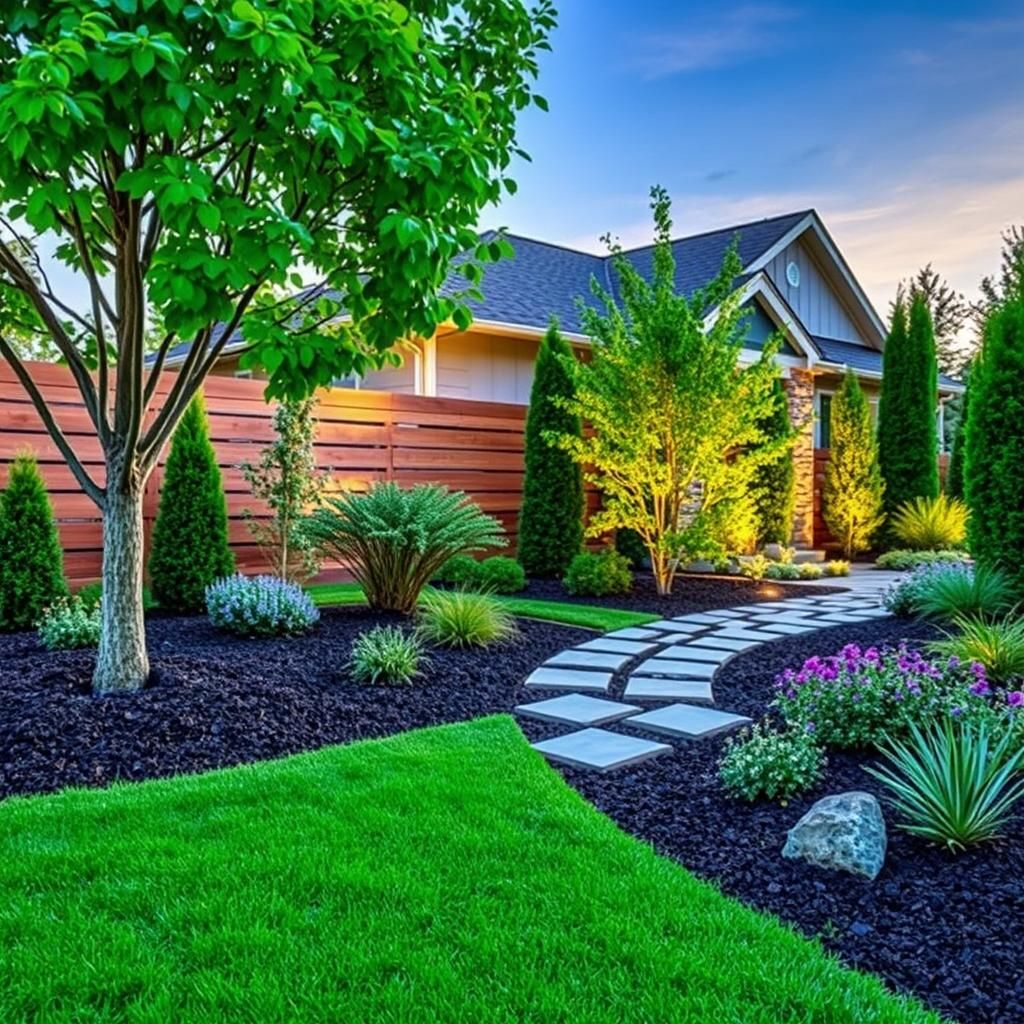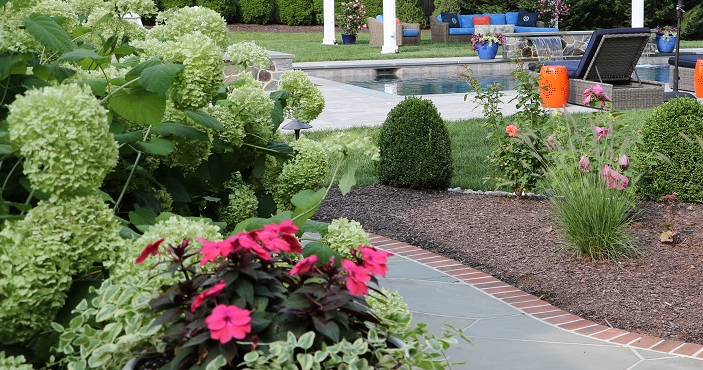Does Landscaping Improve Value? Discover How to Boost Your Property's Worth

Landscaping is often viewed as an aesthetic improvement, but its impact on property value goes far beyond mere looks. With the right design and maintenance, a well-landscaped yard can significantly enhance curb appeal, making a lasting impression on potential buyers. This article delves into the various ways landscaping can elevate your property's worth, from increasing energy efficiency to providing functional outdoor spaces. We will explore key strategies to maximize your investment in landscaping, ensuring that your home not only looks beautiful but also commands a higher market value. Discover how thoughtful landscaping can yield substantial returns on your property.
Does Landscaping Improve Property Value?
Investing in landscaping can significantly enhance the overall value of your property. Well-designed and maintained outdoor spaces not only create a more inviting atmosphere but also attract potential buyers and tenants. Buyers often perceive homes with well-kept gardens and landscaping as more appealing and desirable, which can lead to quicker sales and even higher offers. Studies have shown that proper landscaping can return up to 150% of the investment made, making it a smart choice for homeowners seeking to boost their property's appeal and market value.
The Impact of Curb Appeal on Value
Curb appeal is one of the most critical factors affecting a property's value, as it forms the first impression for any visitors or potential buyers. A well-maintained lawn, attractive flower beds, and a clean walkway can significantly enhance the aesthetic appeal of a home. This positive first impression can translate to a higher perceived value, encouraging buyers to consider the property more seriously and potentially leading to increased offers.
Landscaping Trends That Increase Value
Incorporating modern landscaping trends can further enhance property value. Features such as sustainable gardens, outdoor living spaces, and native plants are increasingly desirable among home buyers. These elements not only contribute to the beauty of the property but also improve its functionality and environmental sustainability. Adopting these trends can make a home stand out in the competitive real estate market.
Routine Maintenance and Its Benefits
Regular maintenance of landscaping is essential in preserving property value. Overgrown plants, weeds, and general neglect can detract from the beauty of a home and signal to potential buyers that the property requires additional care. By consistently maintaining landscaping, homeowners can ensure that their property remains attractive and inviting, positively influencing its overall market valuation.
The Role of Professional Landscaping Services
Engaging professional landscaping services can result in a more polished and thoughtful design, reflecting the latest trends and maximizing the use of space. Experts can create visually appealing outdoor environments that not only enhance beauty but also work within budgetary constraints. By investing in professional landscaping, homeowners can ensure that every aspect of their outdoor space contributes positively to the property's value.
The Financial Return on Landscaping Investments
Research indicates that homeowners can expect a solid return on investment (ROI) from landscaping enhancements. According to several studies, well-executed landscaping can yield an ROI ranging from 100% to 150% or more, depending on the nature of the improvements made. This financial incentive serves as a compelling reason for homeowners to consider landscaping projects seriously, as they can recoup much of their investment when selling their property.
| Landscaping Aspect | Estimated ROI |
|---|---|
| Basic Lawn Care | 100% - 150% |
| Planting Trees and Shrubs | 100% - 200% |
| Outdoor Living Spaces | 80% - 110% |
| Retaining Walls | 100% - 150% |
| Hardscaping Features | 70% - 90% |
Will landscaping increase home value?

Certainly!
Landscaping can significantly enhance the value of a home. By improving the appearance of outdoor spaces, homeowners can create a more appealing environment that attracts potential buyers. Various studies indicate that well-executed landscaping can yield a return on investment ranging from 100% to 200%. Factors like the local real estate market, the complexity of the landscaping project, and the maintenance costs play a role in how much value is added. When done correctly, landscaping not only boosts curb appeal but also creates inviting spaces for families, thereby increasing overall home value.
Benefits of Landscaping for Home Value
Landscaping offers multiple advantages that can positively influence property value. A well-designed landscape can:
- Enhance curb appeal: Attractive outdoor spaces create a favorable first impression for visitors and potential buyers.
- Provide functionality: Landscaped areas can serve as enjoyable outdoor living spaces, adding overall utility to the property.
- Boost energy efficiency: Strategically placed trees and plants can provide shade and windbreaks, reducing energy costs.
Types of Landscaping That Increase Value
Different types of landscaping can have variable impacts on home value. Some effective options include:
See also:
- Native plants: Utilizing local flora minimizes water usage and maintenance while promoting biodiversity.
- Hardscaping: Incorporating features like patios, walkways, and retaining walls can add elegance and functionality.
- Maintenance-friendly designs: Landscaping that requires less upkeep appeals to busy homeowners, making it more attractive.
Cost vs. Value of Landscaping Projects
It’s essential to evaluate the relationship between the cost of landscaping and its return on investment. Key considerations include:
- Initial costs: Assessing the upfront expenses is crucial; some projects may be more profitable than others.
- Ongoing maintenance: Regular care may offset initial investments if not managed properly, impacting long-term value.
- Market trends: Understanding local real estate trends can help identify which landscaping projects are most in demand.
Impact of Local Real Estate Market
The local real estate market heavily influences how landscaping affects home values. Important aspects include:
- Regional preferences: Certain landscaping styles may be preferred in different areas, affecting buyer interest.
- Comparative sales: Reviewing similar homes in the area can provide insight into what landscaping features add value.
- Market demand: A strong housing market typically means higher demand for aesthetically pleasing homes and landscapes.
Tips for Effective Landscaping
To maximize the value added by landscaping, consider the following tips:
- Plan strategically: Begin with a well-thought-out design that enhances the property’s existing features.
- Invest in quality: Selecting durable materials and mature plants can lead to longer-lasting beauty and utility.
- Consider professional help: Hiring a landscape designer may result in optimized plans that maximize property value.
What landscaping adds the most value?

When considering landscaping that adds the most value to a property, it's essential to focus on elements that enhance curb appeal, improve functionality, and contribute to overall property value. Effective landscaping not only makes a home more attractive but can also lead to higher sale prices and quicker sales. Here are the key landscaping features that can significantly increase property value.
Colorful Plantings to Enhance Curb Appeal
Creating visually appealing gardens with vibrant, seasonal flowers can dramatically increase the attractiveness of a property. Colorful plantings bring life to the landscape and can attract potential buyers.
- Annuals and perennials are effective for continuous blooms.
- Incorporating shrubs can create structure and visual interest throughout the year.
- Using different heights and textures helps to add depth to garden beds.
Hardscaping Features for Functionality
Hardscaping refers to non-plant elements in landscape design, such as patios, walkways, and retaining walls. Well-designed hardscapes not only improve the functionality of outdoor spaces but also add significant value to a property.
- Patios extend the living space outdoors, perfect for entertaining.
- Walkways facilitate traffic flow and enhance the practicality of the yard.
- Retaining walls can create tiered landscaping, aiding in erosion control and aesthetic appeal.
Outdoor Lighting for Safety and Beauty
Outdoor lighting does more than add charm; it also enhances safety and security, which are major considerations for potential buyers. A well-lit landscape can showcase the property and its features during evening hours.
- Pathway lights guide visitors safely while enhancing ambiance.
- Spotlights can highlight architectural features and landscaping elements.
- Ambient lighting around patios can create a welcoming outdoor environment.
Water Features to Add Serenity
Incorporating water features such as fountains, ponds, or streams can add a touch of tranquility and luxury to a landscape. These features are attractive to many buyers and create a soothing atmosphere.
- Fountains can serve as focal points in gardens or patios.
- Ponds can attract wildlife, enhancing the natural feel of the property.
- Waterfalls add sound and movement, creating a dynamic landscape.
Low-Maintenance Landscaping for Convenience
Properties with low-maintenance landscaping are attractive to buyers seeking convenience. Gardens designed with sustainability in mind can reduce the amount of time and money invested in upkeep.
- Native plants require less water and are adapted to the local climate.
- Mulching reduces weeds and conserves moisture, minimizing maintenance needs.
- Xeriscaping focuses on drought-tolerant plants, useful in arid regions.
Does landscaping count in an appraisal?

Landscaping does indeed count in an appraisal, and it can significantly influence the overall value of a property. Appraisals are conducted to determine the fair market value of a home, and various elements contribute to this assessment. Landscaping is one of those critical factors. Here’s a detailed exploration of how landscaping affects property appraisals.
Factors Influencing Landscaping Value
Landscaping can add substantial value to a home due to multiple influencing factors:
See also:
- Maintenance: Well-maintained landscapes indicate that homeowners take care of their properties, which can directly affect buyer perception.
- Aesthetic Appeal: Attractive landscaping creates a positive first impression and enhances curb appeal, which is crucial during an appraisal.
- Usability: Landscapes offering usable outdoor spaces, such as patios or gardens, can significantly increase property desirability and, consequently, its value.
Types of Landscaping Enhancements
Different types of landscaping enhancements contribute to appraisal value differently:
- Hardscaping: Features like patios, walkways, and retaining walls can add structural value to the property.
- Softscaping: Planting trees, shrubs, and flowers contributes to the beauty and ecological value of the landscape.
- Irrigation Systems: Efficient irrigation systems suggest an investment in maintenance and can appeal to potential buyers looking for sustainable landscaping.
Impact of Location and Climate
The impact of landscaping on appraisals can vary based on location and climate:
- Regional Trends: Certain landscaping styles may resonate more in specific regions, thereby affecting appraisal values based on local aesthetic preferences.
- Climate Conditions: Landscapes tailored to local climates, such as drought-resistant plants in arid areas, can be more appealing and useful, influencing appraisal evaluations.
- Neighborhood Standards: The overall landscaping quality in a neighborhood sets a benchmark that can increase or decrease the value of individual properties.
Return on Investment (ROI) for Landscaping
Homeowners should consider the return on investment when enhancing landscaping:
- Value Increases: Landscaping improvements can lead to a significant increase in property value, often yielding a high percentage return on the initial investment.
- Market Trends: Investing in contemporary landscaping trends can make the property more attractive to potential buyers, prompting higher appraisal values.
- Cost vs Benefit: It’s essential to balance the costs of landscaping projects with expected benefits; not all landscaping investments yield equal returns.
Professional Appraisals and Landscaping
Understanding how professional appraisals incorporate landscaping is essential:
- Appraiser Guidelines: Appraisers typically follow guidelines that recognize landscaping as an essential component of property value.
- Comparative Market Analysis: Appraisers may compare a property’s landscaping with similar properties to ensure a fair market valuation.
- Detailed Observations: Professional appraisers provide detailed evaluations of the landscaping features, taking into account both quality and maintenance levels.
Is landscape a good investment?

Investing in landscape can be a viable option for various investors, depending on several factors such as location, market demand, and personal goals. Here, we will explore why investing in landscape can be advantageous, the types of investments available, and what to consider before making such a decision.
Understanding Landscape Investment
Investing in landscape involves purchasing, developing, or enhancing property that features natural elements such as gardens, parks, or scenic views. This can include both residential and commercial properties. The appeal of landscapes lies in their capacity to provide a pleasant environment, which can translate into higher property values and increased demand for rentals or sales. The potential for appreciation is influenced by location, climate, and urban development trends.
- Property Value Increase
- Enhanced Aesthetics
- Long-term Investment Potential
Types of Landscape Investments
Landscape investments can come in various forms, including residential yards, commercial green spaces, or agricultural land. Each type presents unique opportunities for returns on investment. Factors such as local market conditions and maintenance costs can affect profitability.
- Residential Landscaping - Investing in residential properties with well-maintained landscapes can lead to increased home value.
- Commercial Properties - Businesses often benefit from attractive landscapes that can draw customers, leading to higher foot traffic and sales.
- Agricultural Land - Investing in agricultural landscapes can yield profits through farming or leasing to farmers.
Factors Influencing Landscape Investment Success
Several factors play a critical role in determining the success of landscape investments. Investors should conduct thorough research about the market and the specific property characteristics before committing.
- Market Trends - Understanding current real estate trends and upcoming developments in the area can provide insight into potential appreciation.
- Location - Properties in desirable locations tend to maintain or increase in value, particularly if they are in areas with good schools, amenities, and low crime rates.
- Environmental Conditions - Factors such as weather and climate can significantly impact landscaping choices and maintenance expenses.
Benefits of Investing in Landscaped Properties
Investing in properties featuring lush landscapes can result in several beneficial outcomes. These properties not only attract potential buyers or renters but also provide emotional and physical benefits to their inhabitants.
- Increased Curb Appeal - Properties with attractive landscapes stand out, often leading to quicker sales and higher offers.
- Improved Quality of Life - Well-maintained landscapes can enhance the quality of life for residents or tenants.
- Lower Energy Costs - Proper landscaping can help reduce energy consumption through natural shading and insulation.
Challenges Associated with Landscape Investments
Despite several advantages, landscape investments also come with challenges. Prospective investors must be aware of these issues to ensure successful investments.
- Maintenance Costs - Maintaining landscaping can be expensive and time-consuming, requiring ongoing investment in services.
- Market Volatility - Real estate markets can fluctuate, impacting property values and rental demands.
- Environmental Regulations - Investors must comply with local zoning laws and environmental regulations that may restrict landscaping choices.
Questions from Our Readers
Does landscaping increase home value?
Yes, landscaping can significantly increase the value of a home. A well-designed landscape not only enhances curb appeal but also creates a welcoming environment which potential buyers find attractive. Studies suggest that effective landscaping can yield a return on investment of up to 150%.
What types of landscaping provide the best return on investment?
Landscaping features such as mature trees, flower beds, and well-maintained lawns are known to provide the best return on investment. Adding elements like patios or lighting can further enhance outdoor spaces and boost overall property value.
See also:
How does landscaping affect the sellability of a home?
Homes with well-executed landscaping tend to sell faster than those without. A beautiful landscape not only catches the eye of buyers but also creates an inviting atmosphere that encourages them to envision themselves living there, making the home more appealing overall.
Are there any risks associated with investing in landscaping?
While landscaping can enhance property value, there are potential risks such as overspending or choosing designs that may not appeal to future buyers. It's crucial to invest wisely and consider industry trends to ensure that your landscaping choices will be beneficial in the long run.

If you want to read more articles like Does Landscaping Improve Value? Discover How to Boost Your Property's Worth, we recommend you check out our Landscaping category.
Leave a Reply
Related Articles